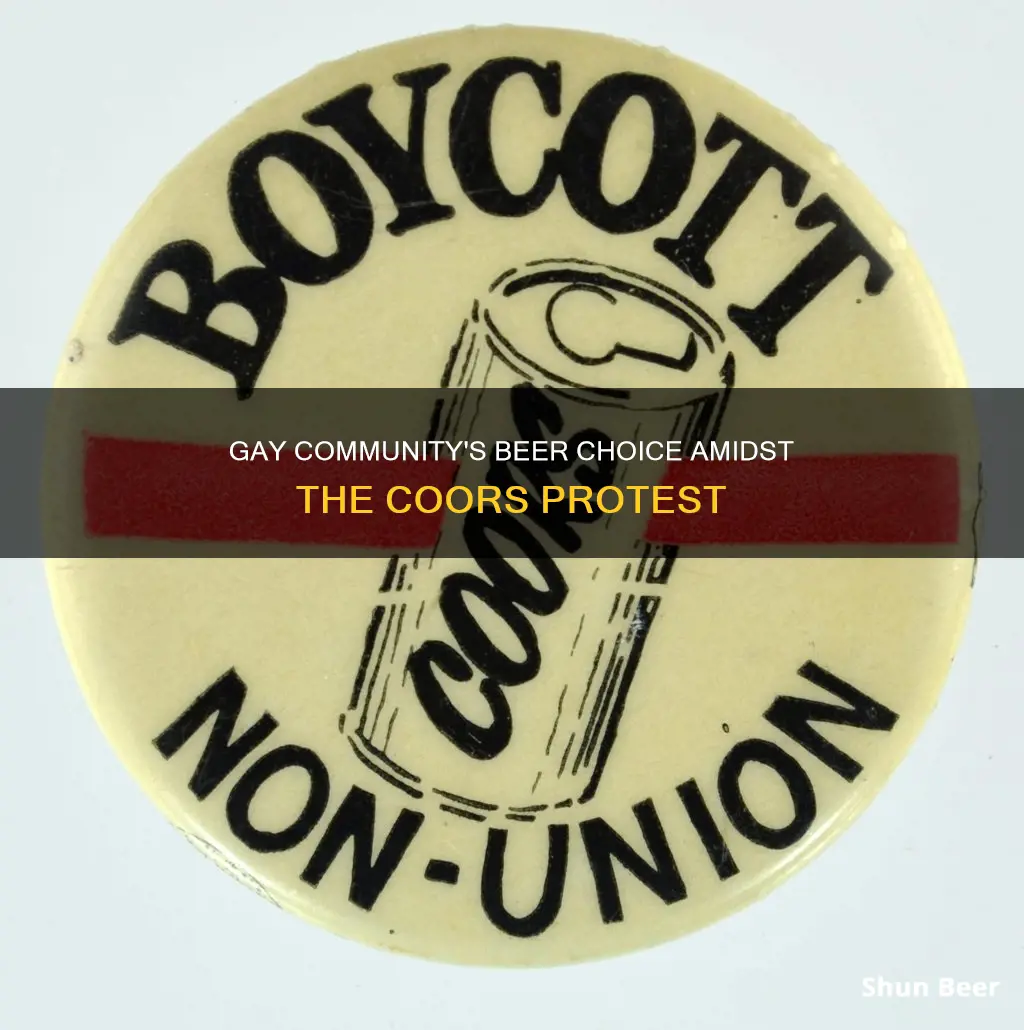
In the 1970s, the Coors Brewing Company was targeted by a series of boycotts and strikes due to its discriminatory employment practices and support for conservative political causes. The company's use of polygraph tests during the hiring process was a significant point of contention, as critics alleged that it allowed them to discriminate against LGBT+ individuals. In response, LGBT+ activists partnered with labour unions to enact one of the most successful boycotts in history, with gay bars across the country refusing to sell Coors products.
| Characteristics | Values |
|---|---|
| Reason for the boycott | Coors' discriminatory hiring practices and support for conservative political causes |
| Who led the boycott | LGBTQ+ activists like Harvey Milk, in partnership with the Teamsters and other labor unions |
| Impact | Coors implemented an anti-discrimination policy that prohibited discrimination based on sexual orientation |
| Legacy | Marked a turning point in the LGBTQ+ rights movement, showcasing the strength and determination of the community and its allies |
What You'll Learn

The Coors Gay Bar Boycott
In the late 1970s, the boycott expanded to include members of the LGBTQ+ community, who opposed Coors' practice of using polygraph tests during the hiring process, which allowed the company to discriminate against LGBTQ+ individuals. Gay rights activist Harvey Milk played a crucial role in the boycott, partnering with the Teamsters and other labour unions to enact one of the most successful boycotts in history.
The boycott gained significant traction, with LGBTQ+ organisations and activists across the United States joining forces. They utilised a range of strategies, including protests, picketing, and spreading awareness through community networks and media channels. The boycott had a substantial impact on Coors, forcing the company to reevaluate its policies and implement an anti-discrimination policy in 1979 that prohibited discrimination based on sexual orientation.
The boycott was successful in making the community aware of Coors' employment practices and forcing the company to respond to the negative publicity and economic pressure. Despite Coors' attempts to repair its image, the boycott left a lasting impact, and as late as 2019, Coors beer was difficult to find in any gay bar in San Francisco. The boycott showcased how labour and gay forces could form an alliance to tackle discrimination and promote LGBTQ+ rights and social mobility.
Drinking Beer on Mississippi Streets: What's the Law?
You may want to see also

The role of Harvey Milk
Harvey Milk was a prominent gay rights activist and politician who played a significant role in the Coors Beer Boycott, one of the most successful boycotts in history. Milk was a noted gay activist and politician, and the first openly gay elected official in the United States, winning a seat on the San Francisco City Council in 1977.
Milk was instrumental in forging an alliance between the gay community and labour unions, particularly the Teamsters union, in San Francisco. He met with Allan Baird, the president of Teamsters Local 921, in 1973 and helped coordinate the boycott, strengthening the bond between the conservative Teamsters union and the city's gay community. Through Milk's influence, the boycott spread throughout the Castro District, San Francisco's gay neighbourhood.
Milk encouraged the Teamsters to hire openly gay people and to oppose the Briggs Amendment, a ballot measure that would have banned LGBT teachers from employment. He also played a crucial role in galvanising the gay community and its allies in the pursuit of equality.
Milk's romantic partner at the time, Scott Smith, was also heavily involved in the boycott and brought it to Milk's attention. Smith, an openly gay truck driver and Teamsters member, worked with Allan Baird to organise a large-scale boycott in the Bay Area, leading to numerous gay bars refusing to sell Coors products.
The Coors Beer Boycott was a response to the company's discriminatory employment practices, including the use of polygraph tests during the hiring process, which allowed them to discriminate against LGBT individuals. The boycott began in the late 1960s and continued through the 1970s, with Milk's involvement starting in 1973. It gained significant traction in the late 1970s, with LGBT organisations and activists across the US partnering with labour unions.
The boycott had a substantial impact on the Coors Brewing Company, forcing them to reevaluate their policies. In 1979, Coors implemented an anti-discrimination policy prohibiting discrimination based on sexual orientation, a significant victory for the LGBT community.
The boycott showcased the strength and determination of the LGBT community and its allies, highlighting the power of collective action and economic pressure as tools for social change. It also demonstrated the importance of solidarity and coalition-building, with LGBT activists joining forces with other social justice movements, creating a more powerful collective voice against discrimination.
The success of the boycott had a lasting impact, and even decades later, in 2019, Coors beer was still difficult to find in any gay bar in San Francisco.
Beer vs Liquor: Which Do Alcoholics Prefer?
You may want to see also

The impact on Coors' business
The Coors strike and boycott, which began in 1966, had a significant impact on the company's business. The boycott, which was led by LGBTQ+ activists, labour unions, and various minority groups, targeted Coors' discriminatory employment practices and its support for conservative political causes. The boycott gained traction in the late 1970s and evolved into a nationwide movement, with activists employing various strategies such as protests, picketing, and media campaigns to spread awareness. This economic and social pressure forced Coors to reevaluate its policies and implement changes.
The boycott had a direct economic impact on Coors, causing a decline in its market share in several western states. In California, Coors' market share dropped from over 40% to as low as 17%. The boycott may have also contributed to Coors' decision to expand nationally, as the company increased its presence from 11 states in 1975 to 49 states by 1988. The negative publicity and loss of revenue prompted Coors to make concessions and change its policies. In 1979, Coors implemented an anti-discrimination policy that prohibited discrimination based on sexual orientation, a significant victory for the LGBTQ+ community.
The boycott also had long-lasting effects on Coors' reputation and relationships with different communities. In the LGBTQ+ community, the boycott left a lasting impression, and even decades later, some groups and activists continued to object to Coors due to its past actions and the family's support for conservative politics. As of 2019, Coors beer was still difficult to find in gay bars in San Francisco. The boycott also damaged Coors' relationship with labour unions, and the company faced continued opposition from unions even after the official boycott ended in 1987.
To repair its image, Coors made efforts to improve its relationships with minority groups. By the 1980s, the company began making deals with several minority organizations, agreeing to do more business with minority companies and hire more minority workers. Coors also donated to LGBTQ+ charities and AIDS-related charities, although these actions were seen by some as a way to counter the negative publicity rather than a genuine commitment to social issues. Despite these efforts, Coors' reputation among certain groups remained damaged, and the company faced continued boycotts and protests from activists and students.
In summary, the Coors boycott had a significant impact on the company's business, leading to economic losses, policy changes, and long-lasting damage to its reputation among various communities. The boycott highlighted the power of collective action and economic pressure as tools for social change, leaving a lasting impact on both Coors and the LGBTQ+ rights movement.
Exploring Alcohol Culture: Beer Drinking in Israel
You may want to see also

The legacy of the boycott
The Coors boycott, which began in 1966 and lasted through the 1970s and into the mid-1980s, had a significant and lasting impact on the LGBT community. The boycott was a response to the company's discriminatory employment practices, including the use of polygraph tests that allowed them to screen for homosexuality during the hiring process. LGBT activists joined forces with labour unions, Hispanic, African American, and women's rights groups to pressure the company to change its discriminatory practices.
The boycott resulted in a labour-gay alliance that transformed an economic dispute into a wider social movement for LGBT rights. It demonstrated the potential of economic pressure as a tool for social change and set a precedent for future campaigns targeting discriminatory corporations. The success of the boycott highlighted the importance of solidarity and coalition-building, with LGBT activists joining forces with other social justice movements to create a more powerful collective voice against discrimination.
The boycott had a substantial impact on the Coors Brewing Company, forcing them to reevaluate their policies and implement an anti-discrimination policy that prohibited discrimination based on sexual orientation in 1979. This policy change was a significant victory for the LGBT community.
Even after the official boycott ended in 1987, the rift between the LGBT community and Coors remained. In the years following the boycott, Coors attempted to make inroads into the LGBT community through targeted advertising and donations to pride parades. However, individuals within the community continued to criticise the company's past actions and the Coors family's support for right-wing politics. As of 2019, it was still difficult to find Coors beer in any gay bar in San Francisco. The boycott highlighted the power of collective action and economic pressure in the fight for LGBT rights and left a lasting impact on both the community and the company.
Accutane and Alcohol: Is Beer-Drinking Safe?
You may want to see also

The boycott's place in history
The Coors beer boycott of the 1970s was a pivotal moment in the history of the LGBTQ rights movement, demonstrating the power of collective action and grassroots organising. The boycott, which lasted for over a decade, was a response to the company's discriminatory hiring practices and its support for conservative political causes that opposed LGBTQ+ rights. The primary objective was to pressure the Coors Brewing Company to change its discriminatory practices, particularly its use of polygraph tests during the hiring process, which allowed the company to discriminate against LGBTQ+ individuals.
The boycott gained significant traction, with LGBTQ+ organisations and activists across the United States partnering with labour unions like the Teamsters. It evolved into a nationwide movement, drawing attention to the discriminatory practices of the Coors Brewing Company and highlighting the potential of economic pressure as a tool for social change. The boycott showcased the strength and determination of the LGBTQ+ community and its allies, fostering alliances across different social justice movements and paving the way for increased understanding and acceptance of diverse identities.
The boycott had a substantial impact on the Coors Brewing Company, forcing the company to reevaluate its policies and implement an anti-discrimination policy that prohibited discrimination based on sexual orientation in 1979. This policy change was a significant victory for the LGBTQ+ community and a testament to the power of collective action. The boycott also had a lasting impact on the LGBTQ+ community, leaving a legacy of continued activism and a heightened awareness of the importance of economic pressure and alliances in social justice movements.
The Coors boycott holds a significant place in history as one of the earliest examples of successful collaboration between labour unions and the LGBTQ+ rights movement. It demonstrated the effectiveness of grassroots organising and economic pressure in fighting discrimination and advocating for social change. The boycott's success set a precedent for future campaigns targeting discriminatory corporations and emphasised the crucial role of solidarity and coalition-building across different marginalised communities.
Ice Fishing and Beer: What You Need to Know
You may want to see also
Frequently asked questions
The Coors strike and boycott was a series of boycotts and strike actions against the discriminatory practices of the Coors Brewing Company, based in Golden, Colorado, United States.
The boycott began in 1966 as a regional affair coordinated by two Hispanic groups and continued through the 1970s, coinciding with a labour strike at the company's brewery in 1977. The strike ended the following year in failure for the union, which Coors forced to dissolve. The boycott, however, lasted until the mid-1980s.
The Coors Brewing Company was accused of discriminatory practices that targeted Hispanics, African Americans, women, and the LGBTQ+ community. The company also supported right-wing political causes and used polygraph tests during their hiring process, which allowed them to discriminate against applicants based on their political affiliations or sexuality.
The boycott was initially led by Hispanic groups, including the Colorado chapter of the American GI Forum and the Denver-based Crusade for Justice. It later expanded to include labour unions, LGBTQ+ activists, women's rights groups, and other minority groups. Notable participants included Harvey Milk, Scott Smith, and Howard Wallace.
The boycott had a significant economic impact on Coors, with a reduction in market share in several western states. It also contributed to a change in company policies, as Coors implemented an anti-discrimination policy in 1979 and ended its use of polygraph testing in 1986. The boycott also helped forge alliances between the LGBTQ+ community and other social justice movements, paving the way for increased understanding and acceptance of diverse identities.







